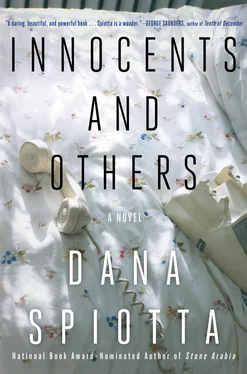Carrie watched the door for Meadow. She probably had trouble parking, or did she say she was taking the train? Carrie shook her head at herself: she might be doomed to a hormonally induced dementia for the duration of her pregnancy. She had read a shocking number of books about it even though she knew that she tended to be highly suggestible. But she couldn’t resist, and when she read about “milk brain” causing women to lose ten IQ points, she felt a logy veil of space-out descend on her. This even though milk brain was a product of nursing (“milk”) and not part of the actual pregnancy. For whatever reason, imagined or biological, Carrie not only felt out of it and forgetful, she had a placid affect: she didn’t really care. She laughed into the empty seat and touched her swelling belly. She liked feeling slow and heavy, embodied. A world unto herself, and barely anything else mattered.
Carrie jumped. Meadow had bent over her and kissed her cheek.
“Hey!” Carrie said. Meadow smelled of mints and cigarettes. Carrie watched her sit on the bench on the other side of the thick-hewn butcher-block table and take off her hat and sunglasses.
Meadow’s black hair was long and sleekly straight. At thirty-five she was already getting some gray strands along her face, which Carrie felt proud to think looked quite fetching. Carrie always gave herself a pat on the back when she found a sign of aging in a woman genuinely attractive, as in, She has wrinkles around her eyes when she smiles, but they look pretty cool. They really actually do, at least on her. But then it usually turned inward and backward to Carrie, as in, But I hate the first tiny hints of a weakening jawline, no one looks good with it, and I catch it in photos now, my wavy jaw especially on the left, just like my mother, and there is nothing to be done, really.
“You look great,” Meadow said with a narrow smile.
“You haven’t even looked at me, you phony bastard,” Carrie said and shook her head. Meadow smiled more broadly now. Carrie got up and turned sideways. Meadow looked her up and down.
“You do look very healthy and glowing and so on,” Meadow said. Carrie nodded at her. “Quieter too, huh? Peaceful? Content?”
Carrie snorted. “Yes, and smugly self-satisfied. Open doors for me, give me the right of way. I am my own reason, people. Because I am manufacturing a person in my freaking body, what are you up to?” Carrie said.
“Seriously, though, the maternal vibe is off the charts.”
The waitress came by. Meadow ordered a glass of wine and Carrie ordered a cranberry juice and club soda. The waitress brought the drinks and a basket of bread. Carrie took a piece and buttered it. She missed having wine, a little, but she liked that she could eat with near impunity, which she hadn’t let herself do since she was maybe six years old.
“How’s Will doing?” Meadow asked.
“Will is good,” Carrie said. “Did I tell you he applied to a bunch of creative-writing MFA programs?”
“I think so. I didn’t realize he wanted to write fiction. Or is it poetry?”
Will had been having a hard time. When he turned forty, he decided a change was needed. He was tired of rallying his bandmates and sick of working as a waiter in a neighborhood restaurant. He was always a good songwriter, and then he started writing short stories as well. One day he came home very excited and told her what he had finally realized about himself. He believed it was a great idea for him to attend a fiction program. Somewhere funded so he could be paid to write for a few years. Carrie honestly found his stories wild and quite funny, and she supported the plan. But secretly she was hoping he wouldn’t get in — she didn’t want to move to Iowa City or Charlottesville or Syracuse. God, no. In fact she couldn’t. They would have to be apart for three years. So deep down she rooted against him getting in, which was selfish and awful of her. He applied to all the top MFA programs, and in the end he was rejected by all of them although he was wait-listed at Michigan and at UVA. There was a time, not that long ago, when she would have gladly confessed all this to Meadow. But things were different now. She felt protective of her life with Will and maybe she didn’t want Meadow to know that she felt the way she did.
“Fiction. His stories are excellent,” Carrie said. “Funny and dark, with lots of language jokes.”
“Like puns?” Meadow said with a rueful lift of an eyebrow.
“No, not fucking puns!”
Meadow smiled.
“Like Mad Libs,” Carrie said, and this made Meadow laugh hard enough to choke a little on her wine. “No, you know, like making fun of jargon, crashing various language systems together for absurd effect, or exaggerating them, like New Age motivational speakers or corporate execs. Like that.”
Meadow nodded and looked at her food. She wasn’t eating much, more pushing the food around the plate. She caught the waiter’s eye and ordered another glass of wine.
“Anyway, he didn’t get in anywhere. Those idiots. So he will be Mr. Mom for a while.”
“Lucky Will.”
“Yeah.”
Meadow drank her wine and looked around the room.
“So how are your folks?” Carrie said.
“Great. They said they saw you at your screening of WACs in LA. They loved it, thought it was very smart and funny.”
“Yes! It was sweet of them to come.” Carrie waited for Meadow to say more, to say she had seen the film, but she found something to stare at in the space behind Carrie, her mind clearly somewhere else. “What about you, Meadow? How’s it going?”
Meadow looked at her, the narrow smile again. “Not great, Carrie.”
“Is it that stupid article?”
Meadow waved her hand as if to say “over it.” But clearly she wasn’t. She stared into the space beyond Carrie’s shoulder again.
“It was stupid and pretty outrageous what they said about you. They would never call Errol Morris a goddamned handmaiden.”
“I don’t want to talk about it.”
“Why don’t you ever call me?” Carrie could hear the scold in her voice.
“I’ve been very busy, crazy. I want to make this movie about Sarah Mills. She’s serving a life sentence for arson, and I think she’s innocent. But I have to put it together. Figure out how to approach it. Because everyone seems to hate my work now.”
“That’s not true. You are so respected.”
Meadow shook her head. Then she sighed. “Everything is so easy for you, an unbroken line,” Meadow said.
“Really? It appears that way, maybe,” Carrie said. She couldn’t really argue that she hadn’t been lucky. She worked hard, but things often broke her way. She knew that.
“And you have everything you’ve ever wanted,” Meadow said, nodding at her belly. “Films. Family. Everything.”
“Okay, listen up. Things aren’t as uncomplicated as they seem. Should I tell you about my life?”
Meadow shook her head.
“For instance, I’m about to have a baby and my husband doesn’t seem to want to sleep with me anymore, and I’m pretty sure he is having an affair.” Carrie hadn’t ever formed those words before, much less spoken them. She started to cry. Meadow looked away from her. “I am trying to finish this film, I am having a baby. I’ve had a very hard time.”
“I’m sorry Will is being a dick, but I’m not surprised. Every marriage is like that, isn’t it? At a certain point?”
“God! Why are you so unsympathetic to me?” Meadow smiled as if this were a joke. Carrie felt herself getting really angry at her. “You told that reporter you haven’t seen my movie. Even if it were true, don’t you think it hurts me to read that?” In the same New York article, Carrie had read that Meadow said this:
Читать дальше












